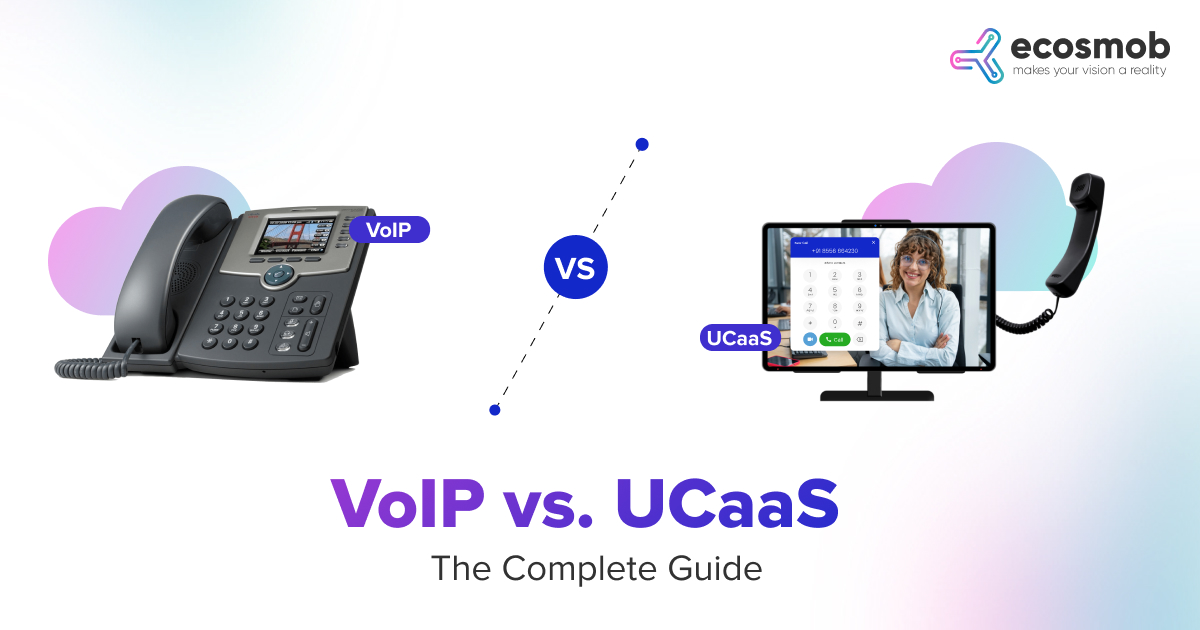Technology is emerging as a great equalizer for businesses. There was a time when big enterprises had the advantage of deploying expensive, cutting-edge tech tools – something that small and mid-sized companies could not afford to bring on board. For instance, until VoIP changed the dynamics of the business communication space, switched phone systems like PBX used to be far too expensive for SMBs to adopt. Larger organizations, on the other hand, onboarded superior telephony capabilities to boost efficiency.
Those days are now long gone. As Unified Communications Solutions have evolved, cost barriers have almost disappeared. New-age technologies like VoIP-powered unified communication solutions are now within reach and well within budget for any business, notwithstanding their size. In fact, these new cloud-driven tech platforms are even enabling SMBs to cut costs and even boost productivity.
Communication is the cornerstone of any business. It plays a huge role in every aspect of an organization – from customer engagement to employee collaboration. Organizations can get their communication strategies right by deploying the right tools, like unified communication solutions.
Unified communication solution providers bring together voice and video calling, messaging, and file sharing onto one seamless platform. This enables organizations to go with one comprehensive tool to enable their employees to collaborate across channels and provide better user experiences to their customers.
It is not a surprise that in the past few years – especially after the pandemic made remote working a norm – organizations are turning to unified communications to make their information systems stronger. UC is budget-friendly, easy to deploy, and simple to operate – making it an attractive telephony option for business leaders who were reluctant to opt for new technologies.
In this blog, we will look at why unified communication solutions are emerging as the hot new telephony option for small businesses.
What is Unified Communication?
Unified communication solutions integrate various communication methods – like calls, chat, file sharing, and emails – under one system, allowing enterprises to manage everything as one piece of architecture rather than various communication components that need to be patched together.
Unified Communication can integrate any medium of computer-related communication technologies, be it instant messaging, voicemail, voice memos, or video conferencing, with VoIP which, in turn, empowers businesses to use the internet to make and receive calls. Besides, data services and transactions conducted on online banking or shopping sites can also be integrated with UC systems.
UC solutions have completely changed the way enterprises connect with each other. Employees can make one-on-one calls, conference with multiple co-workers, message someone in an instant or can view all their work contacts on the same platform. This makes communication faster and more seamless, as it removes the need for getting onto multiple collaboration platforms.
Why Do Small Businesses Need Unified Communication Solutions?
The pandemic has accelerated a shift towards hybrid and remote working, and this has made unified communication for small businesses more important than before.
A primary advantage that UC brings to the business table is integration. With employees depending on cloud-based platforms like accounting and CRM software, information can get siloed into these systems, as the tools work independently of each other. For instance, if a client calls a contact center, the customer service executive may need to open several applications in order to understand the requirements. This can be a time-taking process and could put the customer off.
There can be other issues as well. If a client is on an audio call with a customer service agent and wants to move to a video call to enable a product demo, they will need to switch platforms. This involves a risk of a call drop.
Cloud-based unified communication solutions are emerging as a game-changer for small businesses as they enable integrations with other applications, giving easy access to customer data and making communication and collaboration a seamless process. They also enable users to switch smoothly between phone, video, and chat tools within the same system.
Small businesses are always on the lookout for tools that bring efficiency and productivity into their work processes. Add to this the new remote working culture which has decentralized the workspace and made in-person interactions difficult, and the demand for communication and collaboration tools like UC solutions is skyrocketing.
How Unified Communication Systems Can Benefit Small Businesses
There are many advantages that Unified Communications Systems can provide to small businesses, putting them on the fast track to growth. Let’s look at some major benefits.
Integrate communication onto one platform:
In the modern workplace, voice calls have become just one among many modes of communication. People prefer to use several models, often simultaneously, to boost convenience and suitability. If businesses do not have access to a unified communication platform, switching from one mode to another – for instance, from voice to video – can be difficult. UC solutions provide SMBs with a centralized hub for managing communication.
Lower costs through consolidation:
Stand-alone communication systems can lead to a duplication of applications and efforts for organizations, besides leading to inefficiencies caused by juggling various tools. For instance, your employees may be on multiple chat platforms and video conferencing applications making it difficult for them to meet at one place quickly and easily. Also, the more communication applications, the more the business spends. Unified communication solutions provide a centralized platform where all apps are consolidated into one system. This helps small businesses realize critical financial benefits.
Improved employee productivity and engagement:
The better the communication tools you provide your employees, the more productive they become. Unified communication solutions add value by improving workflows and processes and making communication easier. Employees need to put in less effort to complete everyday tasks. The modern digital economy is a competitive space and small businesses can’t have underperforming employees on their payrolls. With UC solutions, small companies can ensure that their workforce spends less time managing communications and focuses on the actual work at hand. Also, when employees communicate and collaborate easily, they stay more engaged with the company as well as their colleagues, and this shows in the quality of their work output.
Enriched customer communication:
Unified communication solutions help small businesses provide a better and more personalized customer experience by enabling them to connect with their clients via a medium that is most preferable to them. For instance, many customers prefer receiving business information through text messages, instead of phone calls. UC solutions also help enhance employee communication, as they can seamlessly switch from voice to video calls, share their screen or files and enjoy a collaborative experience. Also, UC solutions empower employees to access their business phone numbers from any device, so they never miss an important call.
Higher flexibility and more freedom:
Unified communication solutions provide employees with the flexibility to communicate from any device and the freedom to work from any location – and still be connected to their business phones. This gives small enterprises more control over their workflows and helps boost productivity. For instance, if a client calls on a desk phone number when there is no one to receive the call, it would lead to revenue loss for the company. With a UC solution, the call can be routed to an employee’s personal device and will never get missed.
More time saving:
UC solution providers can provide small businesses with solutions that streamline their communication into a single platform that can be accessed anywhere, anytime via the cloud. Employees can just log into one platform to check their call logs and messages across channels. This increases the efficiency of communication for both the employees as well as customers. Also, since all your communication channels now come under one umbrella, businesses have to pay a single monthly bill and thus simplify their accounting processes.
Boost collaboration:
With UC solutions, employees can collaborate easily using a diverse set of tools and platforms. If an employee is traveling or not available at their workstation, they can still be present on calls and not miss out on being a part of business plans. The instant and real-time collaboration that UC tools provide leads to enhanced productivity, better collaboration, and smoother workflows.
An ability to scale:
As your business grows, your unified communication solution can be easily scaled to keep pace with the growth. This gives small businesses complete control over their communication needs.
Tap into the power of cloud-based phones:
With UC telephony systems can make and receive calls from anywhere and on any device – and they will experience the same call quality. Also, a cloud-based UC system ensures seamless business continuity. In case of any natural or other disruption, employees can continue to call and collaborate from wherever they are.
Must have Unified Communication Features for Small Businesses
What are the most useful features that small businesses must incorporate into their unified communication solution in order to enjoy the full benefits of this internet-powered, cloud-based telephony system? Let’s list some of the top features.
Call analytics: To measure employee performance, analyze team efficiency, and the quality of engagement with customers. If your company reaches out to customers via phone calls, then this feature is a must.
Audio and video conferencing tools: As work models turn increasingly remote, video conferencing has become a critical tool for businesses. They are emerging as the next best thing to in-person meetings. Ensure that the audio and video conferencing tools that your UC solution provider supplies are easy to deploy and require minimal training.
File backup and the power to collaborate from anywhere: Collaboration can be simplified in a big way if small enterprises have a secure and accessible repository for documents. Using UC solutions team members can easily collaborate and work together on files and documents. This means there’s no back-and-forth over emails.
Advanced security: This is critical for businesses to keep their data as well as their customer details safe. If the right security systems are added by your UC solution provider, files can be automatically recovered in case of a ransomware attack or any data loss.
Business texting: Using the business texting feature companies can send and receive text messages by using any internet-powered device. Also, since all text conversations reside on a single platform, they can be easily accessed by any employee. Also, a customer’s text can be recorded along with their phone calls and help desk tickets.
Virtual fax: With UC solutions, small businesses don’t need to invest in separate fax devices. Once the virtual fax capabilities are installed into the app, team members can send faxes to colleagues and customers without requiring bulky equipment and can send documents using their business phone numbers.
UC Solution Buyer’s Guide for Small Businesses
Enterprise Unified Communications platforms come with different features and functionalities. And small businesses will have different communication requirements than larger enterprises with a global workforce.
What are the questions that a small business needs to ask about its communication requirements before they purchase a UC solution?
- How many employees will use the UC platform? Are they remote or on-site workers?
- Do you have employees and customers located in different geographies?
- Does your current internet bandwidth support a unified communication platform?
- Will your IT team be able to handle the implementation?
- Will your UC solution be replacing other communication technologies like Skype?
- What integrations do you need?
- Do you have to comply with privacy and security protocols like HIPAA-compliant video conferencing?
- Do you require cloud storage and backup for your communications?
Once you have got your answers in place, your enterprises can shop for a solution that fits your requirements the best.
Also, understand the benefits of Unified communication that helps in business productivity.
What’s The Future of Unified Communications?
Investing in a comprehensive and secure unified communication platform is one of the best business decisions that a small enterprise can make. It will empower your employees to communicate and collaborate using one system and minimize missed calls and security lapses. It is only a matter of time before small businesses become big buyers of UC solutions.
Ecosmob’s all-encompassing UC platform helps small enterprises to improve employee engagement, reduce costs, and consolidate overlapping tools. To know more, reach us at sales@ecosmob.com.










